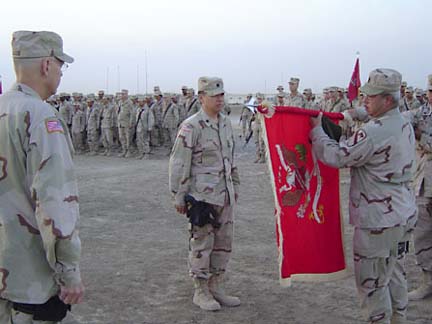

|
In the Military Gregg K. Kakesako |
See also: For Your Benefit
Participating in a unit color ceremony for the 411th Engineer Battalion are Col. William Haghood, battalion commander Lt. Col. Jonathan Wung, and guidon bearer Sgt. Ryan Augustin.
Reserve building
better camp in IraqLt. Col. Jonathan Wung, commander of the Army Reserve's 411th Engineer Combat Battalion, says the Iraqi people his citizen soldiers have met since arriving in Baghdad nearly three months ago "appear to be decent, generous, and hospitable."
Wung writes that in conversations with one of his Iraqi translators "he expressed his happiness for our presence and welcomed the U.S. and coalition forces to help bring a free and stabilized country that was not possible under Saddam Hussein. He also mentioned that he was surprised to see the cultural diversity of our Asia-Pacific based battalion and soldiers, and to hear and learn our different accents, languages, and cultures -- everyone working together as American soldiers. I told him that I also expect that our soldiers will gain a better understanding of his people and culture over time."
Wung said in his camp "food is great and plentiful, typically hot meals are served four times a day (including a late night meal for those personnel who are working the night shift and can't eat dinner). Ice cream, desserts and soft drinks are available at every meal. Bottled water is readily available."
But, as usual, Hawaii soldiers of the Hammerhead Battalion miss some type of favorite foods, snacks, and home-cooked meals.
"Most of our Hawaii and Pacific-area soldiers yearn for local dishes like mixed-plate lunches, steamed white rice, Spam musubi, kalbi, a fresh bowl of saimin, fried noodles, loco-mocos, kim chee, manapua, laulau, poke, sashimi, sushi, lomi-lomi salmon, canned wahoo for our American Samoan soldiers, and a whole list of other Asian-Pacific and home-cooked foods and snacks," Wung said.
Considering what soldiers from early rotations had to endure, Wung added there is "no reason to complain about our living conditions. We're fortunate in our area because we live in trailers; two, three, or four soldiers to a trailer; have shower trailers with warm water, and air conditioners. Laundry service is free."
Sgt. Dan Purcell, of the Army's 122nd Mobile Public Affairs Detachment, reports that the soldiers of the Hammerhead Battalion, especially the members of Company A, are busy improving the quality of life at Camp War Eagle by building hot shower facilities.
"Currently, we have been assigned to build a force protection wall and fix the plumbing problems in the barracks," said 1st Lt. Kelly Heth, general construction platoon leader. "The carpenters we brought along with us are also building benches for the showers and making other small improvements in order to help improve the soldiers' quality of life."
Staff Sgt. Mel Mizukami, a squad leader with the company, said his squad is responsible for taking the barracks' water tanks out of the ground and building cement platforms to place them on. "My squad is prepping the hot water heaters by replacing the wiring and piping them in," Staff Sgt. Stuart Duke, a squad leader, said.
"When we first got here, the plumbing in the barracks was in pretty bad shape," Sgt. Mel Tabion, a plumber with Company B, said. "Some of it was OK, but it was all built very quickly and for the short term. We'll have the plumbing in good working order before we leave."
>>>><<<< The veterans of the 100th Infantry Battalion will celebrate their 62nd anniversary at a luncheon beginning at 11 a.m. June 26 at the Ala Moana Hotel's Hibiscus Room. The 100th Battalion initially was composed of Japanese-Americans drafted in Hawaii before the bombing of Pearl Harbor on Dec. 7, 1941. On June 5, 1942, the 100th was activated and sent to Camp McCoy in Wisconsin for training and went into battle first in Salerno, Italy, on Sept. 26, 1943. Nearly every member of the 100th was awarded at least one Purple Heart In World War II, signifying a wound inflicted during combat. It was because of the battalion's exploits that the call went out for more Japanese-American volunteers, and the 442nd Regimental Combat Team was born.
See the Columnists section for some past articles.
"In the Military" was compiled from wire reports and other
sources by reporter Gregg K. Kakesako, who covers military affairs for
the Honolulu Star-Bulletin. He can be reached can be reached by phone
at 294-4075 or by e-mail at gkakesako@starbulletin.com.
